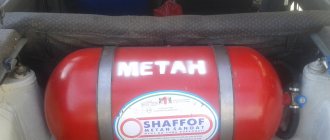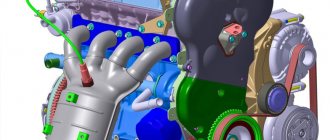Our car dealership in Voronezh offers the new LADA Vesta CNG with a dual-fuel engine running on methane and gasoline. This is an economical, reliable and comfortable sedan package, developed on a completely new platform. Installation and connection of gas equipment is carried out at the factory in compliance with European safety and environmental standards. Thanks to the 2-fuel switching system, you can switch to methane or gasoline whenever you wish.
Leave a request on our website to sign up for a test drive.
Methane Lada Vesta CNG - what is it?
The bi-fuel system is a kind of hybrid of gasoline and gas. The prefix stands for Compression Natural Gas. It is noteworthy that the cost of remaking a standard car will cost approximately 170 thousand rubles. However, as part of government support, VAZ is partially sponsored for conversion. Therefore, new models from the factory will be only 30 thousand more expensive.
Generation choice
At the moment, all gas cylinder installations are divided into 5 generations. Since the Lada Vesta is equipped with simple, in-line power units of atmospheric design, with an injector and distributed fuel injection technology, the fourth generation will be the optimal choice for it.
4th generation HBO scheme.
Earlier generations should not be used, because their technology is currently outdated, and the 5th is intended for turbocharged engines with a direct fuel injection system, which are not available in the Lada Vesta engine line.
5th generation HBO is not suitable for Lada Vesta.
Pros and cons of methane gas treatment
This news has a number of advantages relative to its standard opponent.
- The engine life can increase with proper care due to the fact that the gas will not wash away the oil film from the cylinder walls. In addition, the gas itself does not form deposits, which prevents the appearance of soot;
- Due to the lower cost of methane, the cost per kilometer of travel will be significantly lower. The average value can reach 1 rub./km. However, the engine starts on gasoline. And in some modes, the hybrid modification still injects gasoline into the combustion chamber even when driving on LPG. This allows you to lower the combustion temperature of the fuel mixture and increase reliability;
- increased travel range. The cruising range on gas is 400 km, and the cost of a full tank of gas will be three times lower than the price of a full tank of gasoline. The standard 55-liter gasoline tank also remains in place. Taking this into account, the dual-fuel Lad Vesta can travel about 1000 km on one fill-up, which is a good alternative to modern diesel engines.
The Lada Vesta CNG 2022 2022 also has disadvantages.
- Most natural gas vehicles run on propane. This Vesta is equipped with methane gas equipment. The network of gas stations with this type of fuel is not widespread, especially in peripheral cities. Many gas stations are located directly “on the pipeline” and getting to them is not always convenient.
- Gas equipment is located in the trunk and eats up a fair amount of free space. The remaining space is not that large. Several packs of mineral water can fit here, and although the rear seat backs can be reclining, this option is pointless. The cylinder closes the space, and long items will not fit here. However, the situation can be solved by the Vesta CNG station wagon, the start of sales of which is also just around the corner.
Dimensions of the new body with gas equipment
Visually, the Vesta CNG 2022 differs from the sedan only in the nameplate on the tailgate. Otherwise, a methane-powered car completely replicates an ordinary gasoline modification.
| dimensions | |||||
| Length | Width | Height | Trunk volume | Ground clearance | Volume of the tank |
| 4410 mm | 1764 mm | 1497 mm | 390 l | 178 mm | 55 l |
Available colors
The color palette follows the usual modification offerings. Vesta Cross on gas will go on sale in the following colors:
- white;
- light gray;
- garfit;
- dark grey;
- black;
- golden;
- blue;
- yellow;
- red;
- grey-blue.
Where to refuel?
Now about the sad stuff. There are not many compressed natural gas filling stations in Russia - just over three hundred throughout the country (gasoline - over 25 thousand). But there is some progress: in 2016, 35 such stations were built, and this year it is planned to build twenty-five more.
There are currently four CNG filling stations in Moscow and St. Petersburg. The southern and Caucasian regions are of particular interest; the infrastructure there began to develop earlier - dealers are confident that there will be demand for Vesta CNG.
When refueling at a CNG filling station, you will be given an adapter that you need to snap onto the fitting under the hatch. Connect the dispenser hose to the other end and you can refuel.
When refueling at a CNG filling station, you will be given an adapter that you need to snap onto the fitting under the hatch. Connect the dispenser hose to the other end and you can refuel.
What is different about the new interior?
The interior of the model also resembles a gasoline model. Same buttons and switches, same layout of controls. The main difference is a round button for switching from gasoline to gas and a diode indicator of the fuel reserve in the cylinder. Later, the switch will move to the center console and take a place next to the multimedia center, and the indicator will become part of the function of the on-board computer.
Photo of the cylinder in the trunk
A gas cylinder fits in the trunk. It eats up a significant part of the 480-liter trunk. Now its useful volume is 390 liters. At the same time, the spare tire is partially covered by a casing and it has become more difficult to get it out (see photo of the trunk). The developers promise to solve the problem by entering the market of the Lada vesta sw cng station wagon and a crossover based on it sw cross cng.
Appearance of the updated car. Short review
The exterior of the Lada Vesta CNG is completely identical to other modifications of the Lada Vesta:
- At the front is an X-shaped radiator grille, which was borrowed from the X-Ray;
- Embossed hood with smooth folds on the sides;
- Front optics with logo from the AvtoVAZ concern;
- Fog lights are mounted in the lower part of the front bumper;
- About 75% of the entire area of the front bumper is occupied by a trapezoidal air duct;
- There are X-shaped stampings on the sides of the body;
- Side view mirrors with built-in turn signal repeaters;
- The window sill line is straight.
Technical characteristics of Lada Vesta CNG 2022
The car is equipped with a standard VAZ 21129 engine. The 1.6-liter engine will produce 106 hp. with a torque of about 135 Nm. When driving on gas, the parameters will be slightly lower. Such a car will accelerate to 100 km/h in 11.8-12.9 seconds depending on the type of fuel, and the gearbox will be a 5-speed manual or robot.
| Model | Volume, cubic cm | Maximum power hp/rpm | Torque Nm/rpm | Transmission | Fuel consumption per 100 km |
| 1.6 MT/AMT | 1596 | 106/5800 96/5800 | 148/4200 135/4200 | 5-st. mechanics/robot 5-speed | 5.5/9.3/6.9 l 5.3/9.0/6.6 l |
Bi-fuel system - gas and gasoline
A special feature of the bi-fuel Vesta is that it can run on gas or gasoline.
In the trunk there is a 90-liter gas cylinder that can hold up to 22 cubic meters of methane. The operating temperature range is from -40 to +55 degrees Celsius. When driving on methane, the car's performance drops somewhat. The engine with LPG will produce 96 hp. and 135 Nm of torque. However, it will not be possible to distinguish the behavior of the car in civilian driving modes.
What is the difference between propane and methane. The principle of operation of a methane engine
Propane and methane are gas-fuel substances that have the same purpose, but fundamentally different characteristics. Propane is a product of the oil industry, while methane is classified as a natural gas. When used as fuel for HBO, both gases are placed in cylinders, the thickness of the walls of which also depends on the substance for which they are intended.
Liquefied propane does not require excessively high pressure when filling the cylinder; accordingly, the walls of the propane storage are not too dense (4-5 mm). Methane is used only in gaseous form, and its pressure reaches extremely high levels. Methane cylinders are much larger in size, their walls are strong (2-3 cm). During combustion, methane is harmless to the environment, which is why it is recognized by world standards as the most environmentally friendly combustible fuel. The most important difference between the two categories of gases is the degree of their safety for the driver and passengers of the car. Methane, unlike propane, is light, which allows the substance to evaporate (if it leaks) before creating an explosive situation. Since methane has no color or odor, the gas is diluted with specific odorants that make it possible to identify a leak. In Russia, the lion's share of car owners prefer installing propane gas equipment due to its lower cost and the relative lightness of fuel cylinders. Methane equipment is much more expensive, but the price of methane, its environmental friendliness and operational safety cover this disadvantage. A methane engine operates on the same principle as a gasoline engine (the compressed mixture is ignited by an energy source) with one fundamental difference - an increased level of compression. The source of fuel supply is a gas cylinder, which is installed in the trunk of the car and is equipped with a special valve, through which both the equipment is refueled and gas is supplied to the system.
Gas consumption and range
Depending on the type of fuel, the car’s appetites also change. Vesta consumes about 7 liters of fuel after running in. Gas consumption is 6.2 cubic meters. m3 in a mixed cycle. The cost of methane is about 14 rubles, so the feasibility of buying a gas Vesta is quite justified.
| Modification | Methane consumption |
| Standard | 6.9 l |
| CNG | 6.2 cubic meters |
Comparison of Lada Vesta CNG 2022 with Renault Logan and Kia Rio
| Comparison parameter | CNG Classic | Renault Logan Access | KIA Rio Classic |
| Engines | |||
| Minimum price in rubles | 609 000 | 499 000 | 699 000 |
| Base motor power (hp) | 106 | 82 | 100 |
| At rpm | 5800 | 5000 | 6000 |
| Maximum torque in Nm | 148 | 134 | 135 |
| Maximum speed in km/h | 172 | 172 | 185 |
| Acceleration 0 – 100 km/h in seconds | 12,6 | 11.9 | 12.2 |
| Fuel consumption (highway/average/city) | 5,5/9,3/6,9 | 9.8/5.8/7.2 | 7.2/4.8/5.7 |
| Number of cylinders | 4 | 4 | 4 |
| engine's type | Petrol | ||
| Working volume in l. | 1,6 | 1,6 | 1,4 |
| Fuel | AI-92/95/methane | AI-92/95 | AI-95 |
| Fuel tank capacity | 55 l/90 l cylinder | 50 l | 55 l |
| Transmission | |||
| Drive unit | Front | ||
| Transmission | Manual transmission | ||
| Number of gears | 5 | 5 | 6 |
| Chassis | |||
| Availability of alloy wheels | — | — | — |
| Tires | R15 | R15 | R15 |
| Body | |||
| Number of doors | 5 | 5 | 5 |
| Body types | Sedan | ||
| Curb weight in kg | 1150 | 1106 | 1080 |
| Permitted weight (kg) | 1580 | 1545 | 1530 |
| Dimensional | dimensions | ||
| Length (mm) | 4410 | 4346 | 4410 |
| Width (mm) | 1764 | 1732 | 1730 |
| Height (mm) | 1497 | 1517 | 1470 |
| Wheelbase (mm) | 2635 | 2634 | 2600 |
| Ground clearance/clearance (mm) | 178 | 160 | 160 |
| Salon | |||
| Trunk volume | 390 | 510 | 480 |
| Options | |||
| ABS | + | + | + |
| On-board computer | + | — | + |
| central locking | + | — | + |
| Rear electric windows | — | — | — |
| Airbags (pcs.) | 1 | 1 | 2 |
| Air conditioner | — | — | + |
| Heated mirrors | — | — | + |
| Front electric windows | + | + | + |
| Heated seats | — | — | — |
| Fog lights | — | — | — |
| Steering wheel adjustment | + | + | + |
| Seat adjustment | — | + | + |
| Stabilization system | — | — | + |
| Audio system | — | — | — |
| Metallic color | 12,000 rub. | 14990 rub. | + |
Competitors
| Name | Price in euros |
| Volkswagen Polo | From 12750 |
| Ford Fiesta | From 12500 |
| Peugeot 208 | From 12400 |
| Hyundai i20 | From 12200 |
| Opel Corsa | From 11990 |
| Citroen C3 | From 11900 |
| Toyota Yaris | From 11900 |
| Renault Clio | From 10500 |
| Kia Rio | From 10500 |
| Dacia Duster | From 10500 |
| *price indicated as of 04/08/2019. | |
Registration in order - received by OTTS
The car has passed all the necessary test drives and received vehicle type approval (VTA). The methane sedan is recognized as safe for use in everyday conditions. VAZ factory crash tests showed the reliability and safety of all connections. When testing for a frontal, side or rear impact, the seal of the cylinder was not compromised.
Components
The metal-composite gas cylinder for compressed natural gas is located behind the back of the rear seat and is equipped with a built-in fuse and high-speed valves, eliminating the possibility of cylinder rupture and uncontrolled gas release in the event of a gas pipeline failure. The gas filling device is located on the right side of the car in the hatch next to the neck of the gas tank.











